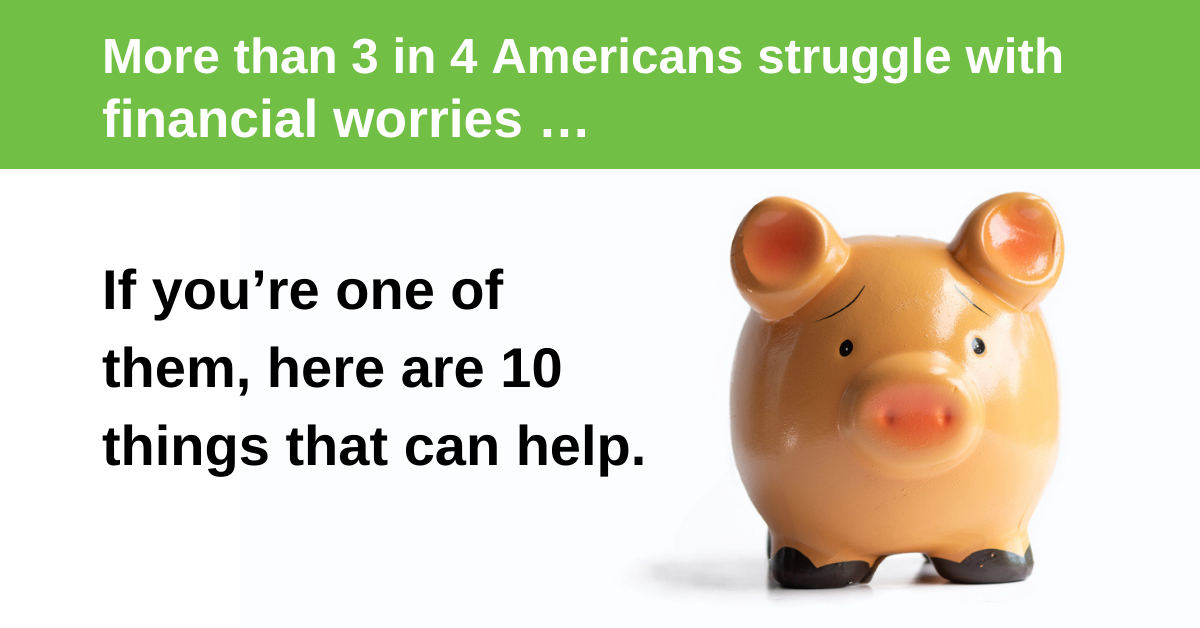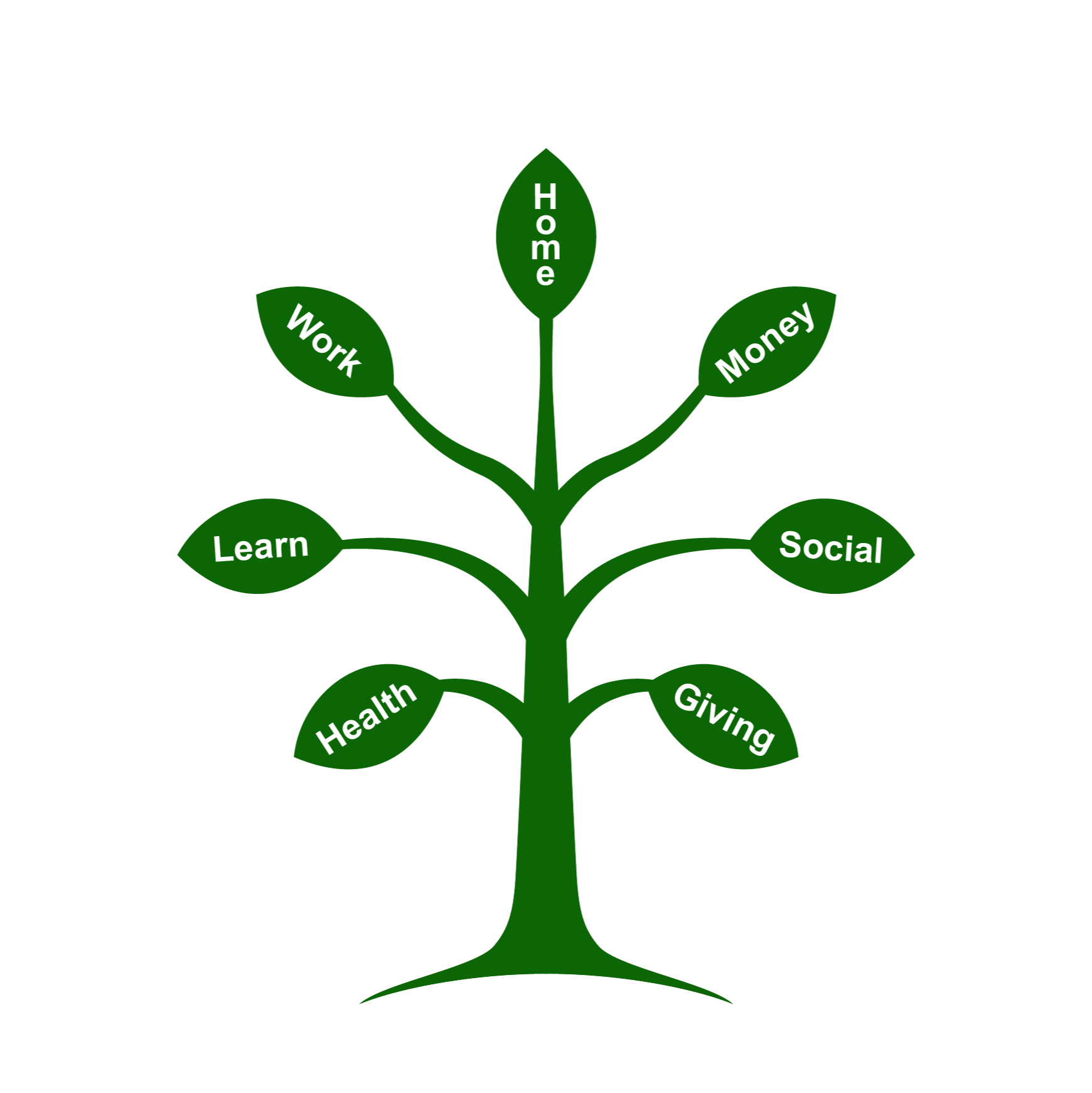10 Ways to Fight Financial Anxiety

If financial anxiety is keeping you up at night lately, you’re definitely not alone. CNBC reports that 77% of Americans struggle with financial worries — and according to Forbes, only 44% could cover an unexpected $1,000 expense.
Financial anxiety can take a significant toll on both mental and physical health. And while there can be quite a lot to worry about these days, nonproductive worry does nothing to help solve any problems you might be facing — and can even prevent you from finding solutions to them. One study found that the amount of stress triggered just by watching an upsetting movie scene inhibited effective problem-solving (and that’s fictional stress)!
But why is this such a widespread issue — where’s all this money anxiety coming from? For one, Americans are facing increasing economic headwinds. Food insecurity, difficulty affording shelter, and challenges meeting medical or other basic needs are immediate and existential threats for far too many — and aren’t limited to those in lower income brackets. In fact, more than a third of employees making at least $100,000 per year live paycheck to paycheck, according to a recent report. A certain amount of fear is a rational and reasonable response to living in the face of constant economic peril.
Second, social media platforms, replete with humble braggers complaining about the high costs of maintaining yachts and vacation homes, can fuel and feed anxiety for an even broader swath of the population. FOMO and other factors stoke and distort cultural values by conflating money with success and self-worth, adding to more tangible stressors. Sometimes, merely acknowledging these two very different types of financial worry can help those who fall into the second camp gain needed perspective.
What You Can Do to Recenter
1. Take one baby step. If at all possible, start making progress in course correcting your situation — even if it’s just to prevent it from getting worse. If your budget is in the hole each month, cut expenses to break even or slow down mounting debt. Setting and achieving even a minor financial goal can have a positive and highly motivating effect on your emotional state and future behavior. Take one small step to improve your situation today — it could be as small as saving $20 by brown bagging your lunches for a week. Progress begets progress.
2. Challenge irrational thoughts. Push back on catastrophic thinking pertaining to money. Ask yourself how likely it is your fear will pan out — and how you might still mitigate your risk and exert control with your response. Avoid projecting low-probability, worst-case scenarios and remember that your self-worth does not equate with your net worth. We’re often much harder on ourselves than we’d ever be on someone we care about. Think about what you might tell a friend or family member struggling financially and afford yourself the same degree of compassion and understanding. Examine familial attitudes (anxieties) about money you picked up as a child or young adult, and evaluate whether those beliefs serve you or are in need of an update. And by all means, resist comparing yourself unfavorably to peers — or social media financial gurus — when it comes to personal finances, as oftentimes there’s more to the picture than meets the eye.
3. Get off the hedonic treadmill. No, it’s not about taking a break from your gym routine. Also called hedonic adaptation, in the context of personal finance, this phenomenon refers to the tendency to readily acclimate to changing economic events or conditions — for better or worse — and return to a baseline level of happiness. It also predicts that when you get a lifestyle bump (like a new house or car) it will give you less and less satisfaction over time. One study, however, suggests that seeking out novelty and variety in your improved situation can help you remain appreciative — and happier with what you have — longer. So, drive that new car to new places to discover new experiences and stave off the desire to prematurely upgrade your ride. Note that this also means that distress over deteriorated financial conditions should naturally abate over time along with accompanying anxiety, if you can just wait it out.
4. Set limits and compartmentalize. Control how much time you spend engaging in finance-related activities that trigger anxiety without leading to positive and productive change. These can include watching or reading financial news, visiting social media sites, monitoring the stock market daily, or frequent review of investment, credit card and bank balances. Designate specific times each week to address money concerns head on. Write down what specifically you intend to focus on ahead of time to avoid spinning off into circular, ruminative and nonproductive worry.
5. Empower yourself. Improve your financial literacy through reading, taking a course or watching educational videos from vetted and reliable sources. The U.S. Office of the Comptroller of the Currency offers an online directory of financial literacy resources (see Sources below). Call in a financial professional, if possible, to work through budgeting and debt issues — ask your HR department if you have free access to one, or to financial wellness educational materials, through your employer. If you engage a financial advisor, look for a fiduciary who’s obligated to act in your financial best interest. Consider seeking the services of a career consultant or headhunter who may help you pivot into a higher paying job with better benefits.
6. Seek practical and concrete assistance. It’s exceedingly difficult to tackle financial anxiety or change your situation while struggling to get basic needs met. But you can find assistance from governmental and charitable sources. Look online or contact your local municipality to find NPOs active in your city or state. You can also reach out to faith-based organizations or food banks for help. If student loans are keeping you up at night, you may be able to lower (sometimes to $0) your monthly payment by enrolling in an-income driven repayment plan (see Sources). And if you’re a senior, the Office for the Aging or Department for Eldercare in your county may be able to direct you to a free meal service, lower cost housing and medication discount programs. If you can’t afford health care and don’t qualify for Medicaid coverage, you can often access low-cost health care at a nearby community health center (see Sources for link). Also, talk to your creditors — explain your situation to see if you can work out a repayment plan to temporarily lower your monthly obligation and obtain some relief.
7. Don’t go it alone. Reach out to friends, family, clergy or a professional therapist for emotional support. Don’t engage in conversations about money with anyone who makes you feel less than or amplifies your worries. You may already have access to an EAP (Employee Assistance Program) counselor or other psychological specialist through your workplace or health insurance plan. If you don’t, research publicly funded mental health centers in your state. And if you reside near a university with a graduate psychology program, inquire whether they operate a community counseling center that offers supervised treatment by doctoral students. They often provide low-cost services and charge on a sliding scale.
8. Monitor and address serious concerns. If you’re dealing with severe depression or anxiety to the point that it’s interfering with your ability to function, contact your health-care professional. He or she may prescribe medication to help and/or refer you to a counselor. If you’re having thoughts about self-harm, call the National Suicide Prevention hotline at 800-273-8255. Whatever you do, don’t ignore serious warning signs — and never suffer in silence.
9. Practice self-care. Many anxiety management strategies have been implemented with positive results by those who suffer from excessive worry. For example, you could try improving sleep, nutrition and exercise (in consultation with your health-care provider); adopting a meditation practice; journaling; relaxation exercises; limiting caffeine and alcohol intake; breath work (which has been scientifically shown to physiologically reduce symptoms of anxiety, depression, anger and confusion); or spending time in nature.
10. Cultivate gratitude. Set your intention on being thankful for what you have and place greater focus and attention on the good things in your life that money can’t buy, such as health, important relationships and having causes or interests you’re passionate about. Lend a helping hand to those who have less than you. Volunteer at a homeless shelter or work on a Habitat for Humanity home. You can always give your time, energy and compassion, no matter the balance in your bank account.
Mount a Multipronged Attack on Anxiety
Financial anxiety is real — as are the tangible problems that often underlie it, which unfortunately are rarely fixed overnight. No one tactic is a silver bullet. Meditation alone, for example, is unlikely to resolve anxiety completely, but adopting a multifaceted strategy that incorporates meditation in combination with other approaches may help provide significant relief and allow you to mount more emotional and mental resources to deal with financial challenges and concerns.
Remember too that this discussion is about reducing unexamined, excessive and nonproductive financial anxiety. Anxiety is our built-in, internal personal warning system. Obliterating financial worry entirely isn’t realistic, and it may not even be advisable. When manageable levels of anxiety motivate us to pay more attention to our finances in a healthy way, it can prompt us to take positive steps to improve our situation. That means sometimes a few money jitters can actually serve as a helpful signal to take action and empathize with others facing similar (or worse) struggles, thereby encouraging us to take better care of both ourselves and those around us.
Sources
https://www.cnbc.com/2022/06/16/more-high-earners-are-living-paycheck-to-paycheck.html
https://studentaid.gov/manage-loans/repayment/plans/income-driven
https://www.sciencedaily.com/releases/2005/11/051117174336.htm
https://www.healthcare.gov/community-health-centers/
https://www.psychologytoday.com/us/blog/the-science-success/201208/how-keep-happiness-fading
https://www.ncbi.nlm.nih.gov/pmc/articles/PMC6137615/


